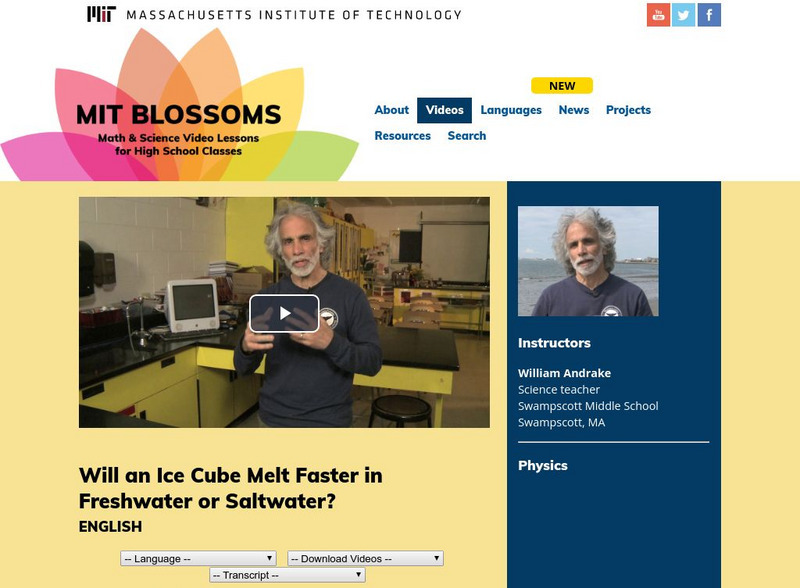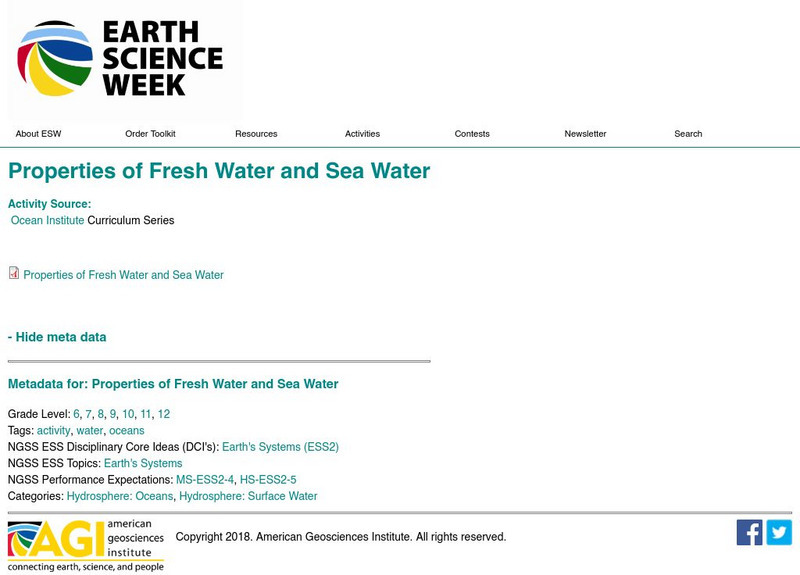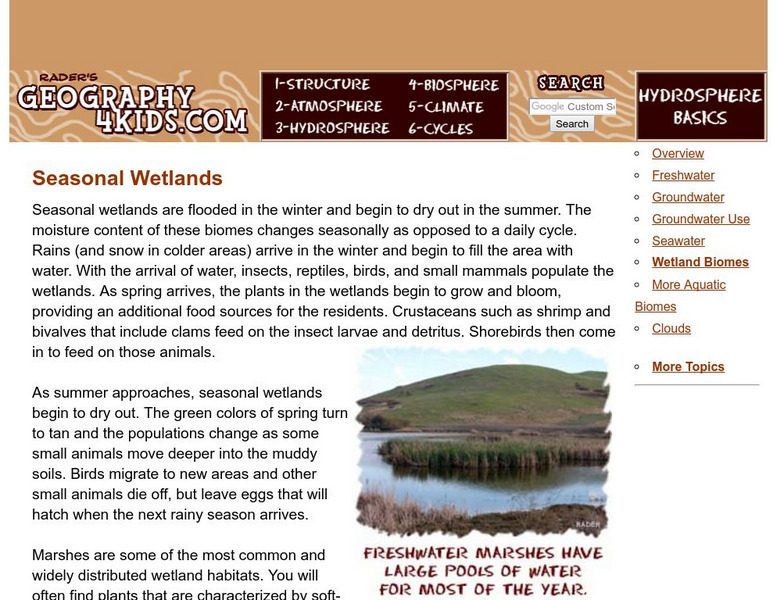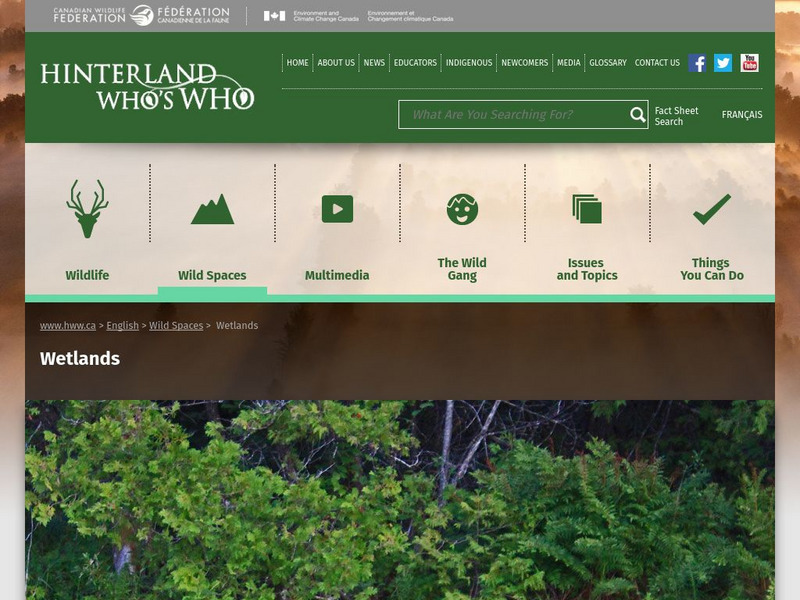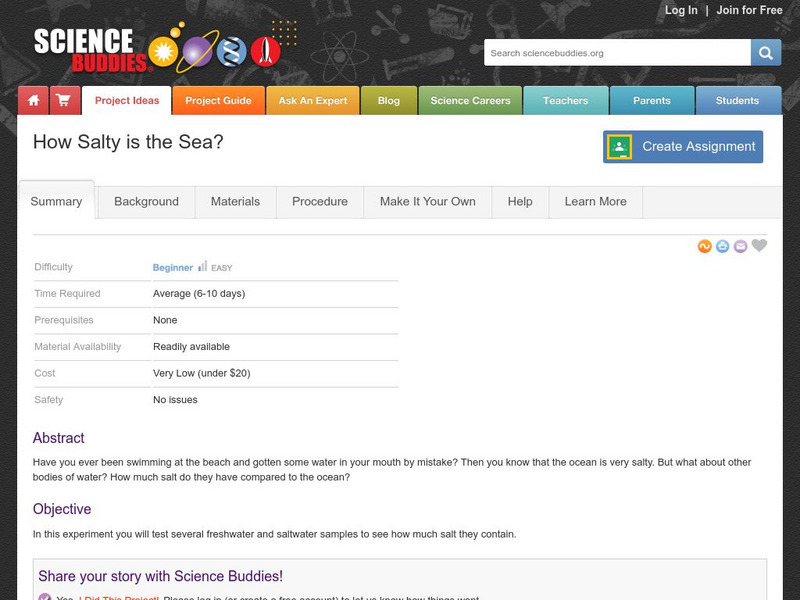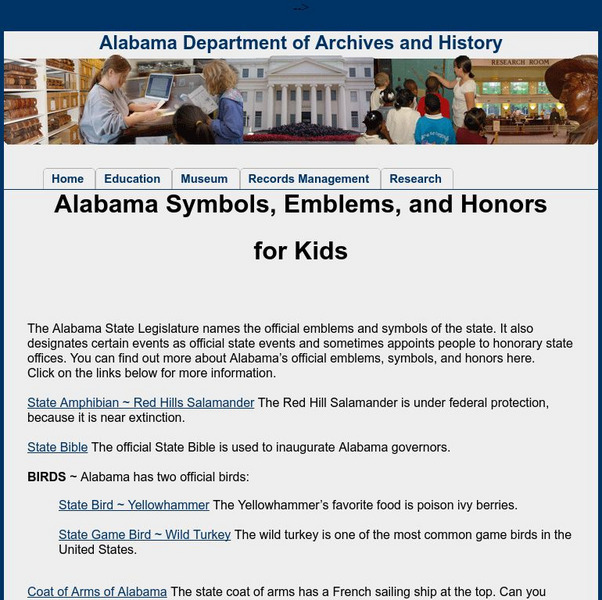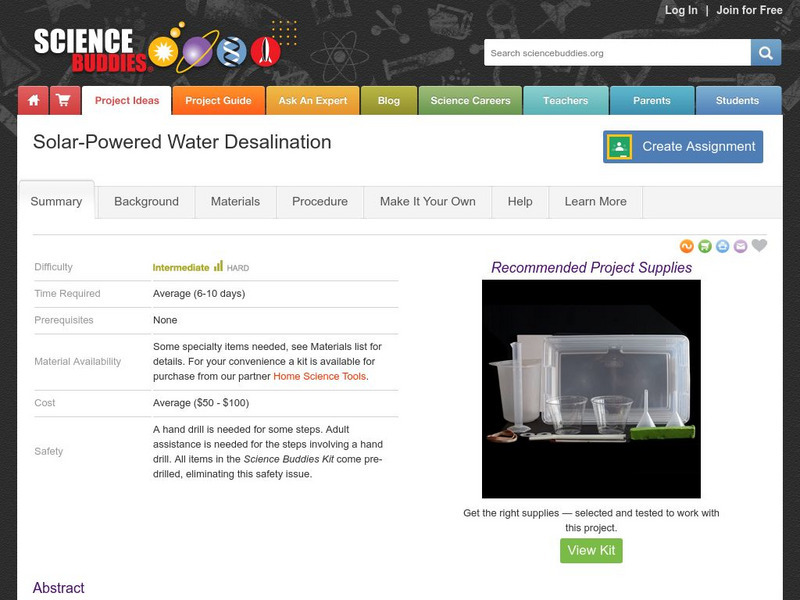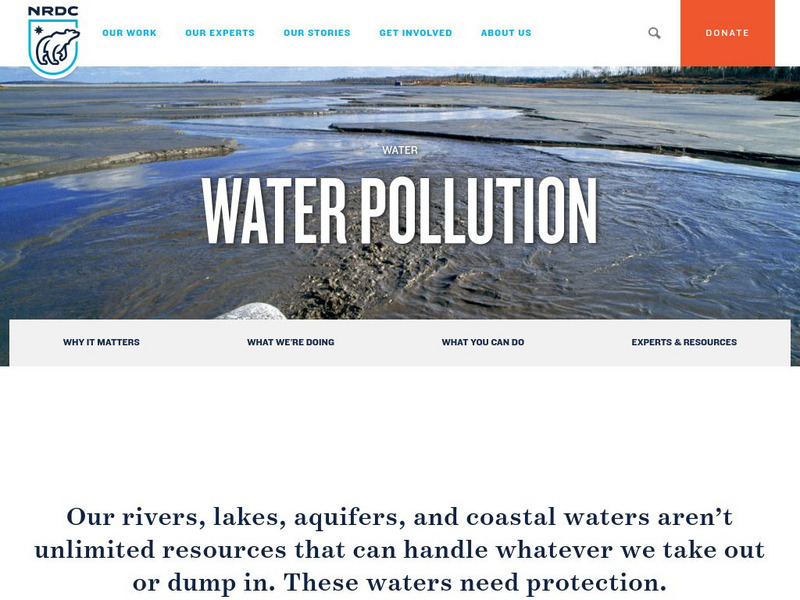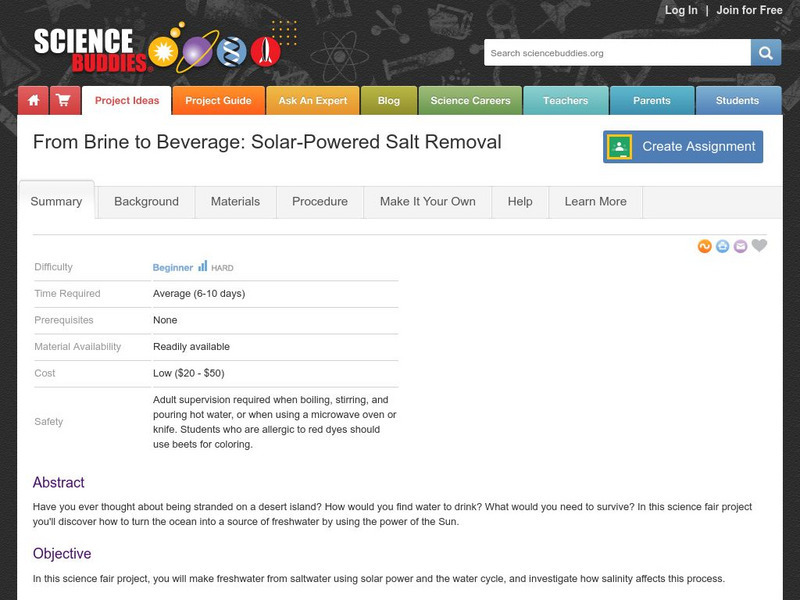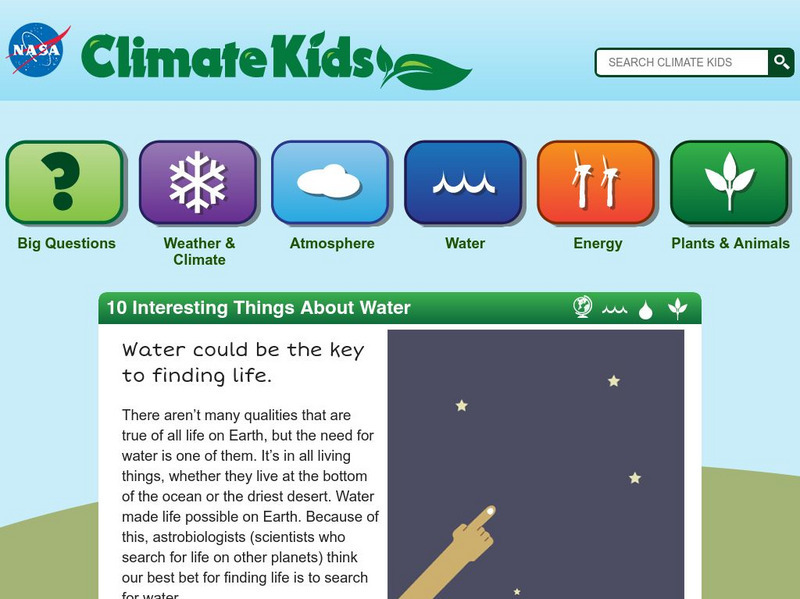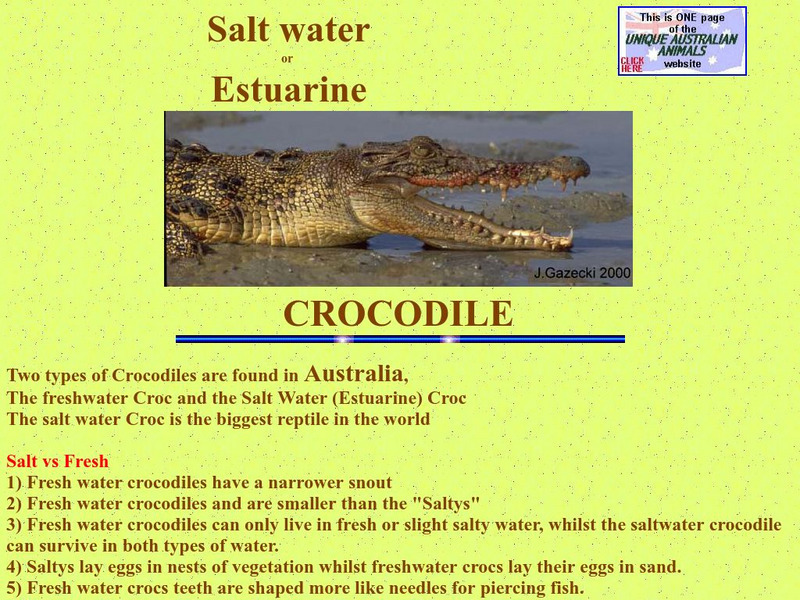Hi, what do you want to do?
Massachusetts Institute of Technology
Mit: Blossoms: Will an Ice Cube Melt Faster in Freshwater or Saltwater?
Engage students in the study of the ocean and saltwater with these activities. Students will see that saltwater has different physical properties than freshwater - mainly density. This lesson can serve as a springboard into other...
American Geosciences Institute
American Geosciences Institute: Earth Science Week: Properties of Fresh Water and Sea Water
Learners set up three demonstrations to observe the properties of water. They explore the boiling point of water, the freezing point of water, and the ability of water to store heat.
US Geological Survey
Usgs: Earth's Water: Lakes and Reservoirs
The USGS reviews the differences between lakes and reservoirs. They discuss the history of freshwater and salt water lakes. Click Home to access the site in Spanish.
Geography 4 kids
Geography4 kids.com: Seasonal Wetlands
Identify the four types of seasonal wetlands found across the earth. There are fresh water and salt water marshes, bogs, and swamps.
Canadian Wildlife Federation
Hinterland Who's Who: Wetlands
Learn about Canada?s wetlands, what they are and where they are located. Wetlands are divided into two classes: freshwater and saltwater. They are further separated into four main types: ponds, marshes, swamps, and peatbogs. Discover the...
Science Buddies
Science Buddies: How Salty Is the Sea?
Have you ever been swimming at the beach and gotten some water in your mouth by mistake? Then you know that the ocean is very salty. Bodies of freshwater also contain some salt, but much less compared to oceans. In this experiment you...
NOAA
Noaa: National Ocean Service Education: Estuaries
Illustrated tutorial explains estuary ecosystems. Animations and illustrations help students become more familiar with the plant and animal communities which make up this coastal habitat.
The Wonder of Science
The Wonder of Science: 5 Ess2 2: Water Availability and Distribution
With these lessons, student can provide evidence to how water is distributed around Earth by interpreting graphs of the amounts and percentages of water in various reservoirs. On this site find work samples, phenomena, assessment...
CK-12 Foundation
Ck 12: Second Grade Science: A World of Ice and Water
[Free Registration/Login may be required to access all resource tools.] Covers different bodies of water, including rivers, lakes, and oceans.
Other
Alabama Emblems, Symbols and Honors
A list of all of the state emblems and symbols for the state of Alabama. Clicking on the underlined link will bring up a picture of the symbol or emblem.
Climate Literacy
Clean: Effects of Increased Co2 in the Air on Seawater and Distilled Water
Students perform an experiment comparing the impacts of CO2 on salt water and on fresh water. In a short demonstration, students examine how distilled water and seawater are affected differently by increasing carbon dioxide in the air.
Scholastic
Scholastic: Study Jams! Science: Ecosystems: Aquatic Ecosystems
A video and a short multiple-choice quiz on the topic of aquatic ecosystems. It discusses the difference between freshwater and saltwater ecosystems, then explains what the three ecozones are in a marine ecosystem.
HotChalk
Hot Chalk: Lesson Plans Page: Aquatic Wildlife and Pollution
This lesson plan is designed to teach young children about healthy and hazardous marine and freshwater environments and be able to describe the effects of the pollution of plastics on wildlife.
NOAA
Noaa: Estuaries 101 Curriculum: Nutrients in an Estuary
An overload of nutrients, called eutrophication (Greek for "good-nutrition"), can be harmful to estuaries. This phenomenon is also referred to as "over-enrichment," or "nutrient pollution". Students will investigate the range of...
American Geosciences Institute
American Geosciences Institute: Earth Science Week: Sea and Ice Salinity
Students investigate the effects of salinity on the formation of sea ice, and whether salt water freezes more quickly or more slowly than fresh water.
Science Buddies
Science Buddies: Solar Powered Water Desalination
Here is a cool project about making fresh water from salt water using solar power, also known as water desalination. The apparatus is made from readily available materials, and the power source is free. As an inventive thinker, you will...
Other
Nrdc: Clean Water and Oceans
What prompted congress to pass the Clean Water Act? Has this legislation been successful? The Natural Resources Defense Council offers information on fresh and ocean waters, pollution control, conservation, and more.
Enchanted Learning
Enchanted Learning: Alabama Facts, Map and State Symbols
Do you need information about Alabama? Find facts, a map, and state symbols. Pictures of many of the state symbols are included.
NASA
Nasa: Polar Ice and Its Possible Effects on the Earth
This article describes the effects of polar ice caps on the Earth and offers explanations as to the possible effects of polar ice melting on sea level and temperature.
Science Buddies
Science Buddies: From Brine to Beverage: Solar Powered Salt Removal
In this science fair project you'll discover how to turn the ocean into a source of freshwater by using the power of the Sun, and the water cycle. You will ultimately find just how salinity affects this process.
NASA
Climate Kids: 10 Interesting Things About Water
Discover 10 very interesting things about water, including sources of life, ocean ecosystems, freshwater and ice, salt and salt water, sources of water, the body's water makeup, plant's consumption of water and the 3 states of water.
Unique Australian Animals
Unique Australian Animals:salt Water/estuarine Crocodile
Here you can learn all about salt water crocodiles. What makes them different than fresh water crocodiles? Where are they found? What kind of habitat do they live in?
PBS
Pbs Learning Media: The Water Planet
75% of our earth is covered by water. Water can be found in oceans, lakes, rivers, groundwater, and sea ice. View these captivating photos of our earth showing the different water sources and images of our earth taken by NASA. Background...
Other
San Francisco Bay Area Wetlands Restoration Program
Homepage for the massive wetlands restoration project in San Francisco Bay. History, objectives, and benefits of the project are described.





